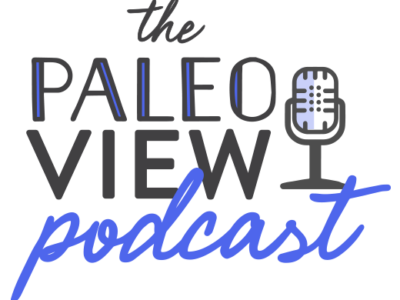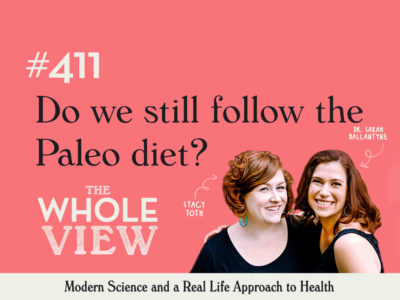In this episode, Stacy and Sarah are joined by Joel Salatin, proprietor of Polyface Farm, author, and key advocate in the sustainable farming movement, to discuss the health and environmental benefits of pasture-raised meat.
Listen in iTunes
or download and listen by clicking the PodBean player below
We’re now on Stitcher!
If you enjoy the show, please review it in iTunes!
The Paleo View (TPV), Episode 45: Special Guest, Joel Salatin from Polyface Farm!
- 0:00 – Introduction
- 1:19 – News & Views
- Skype fears were sorted out and it looks like the show is safely recording
- Sarah has decided to head to Virginia for the Beyond Bacon release party on July 5 – it is her first time away from her family, which she is kind of nervous about, but is way excited!
- It will not only be the first time that Sarah and Stacy meet, but Sarah will be meeting many other bloggers for the first time as well
- Beyond Bacon comes out next week!
- Stacy checked out Joel’s Pigs ‘n Glens show yesterday and thought it was fantastic and a perfect mesh with this week’s show
- Joel is the proprietor of Polyface Farms, a family-owned farm, he has been in a number of documentaries, and he is an author of several books including Folks this Ain’t Normal, Pastured Poultry Profit$, The Sheer Ecstasy of Being a Lunatic Farmer, Family Friendly Farming, Everything I Want to Do is Illegal, he also recently began a video series called Polyface Primer Series
- Joel is very excited about the videos, which will be streaming online soon, the content is educational and fun
- Joel also wrote the forward for Beyond Bacon and was one of the reasons why the Paleo Parents started eating sustainably and created their site to share recipes centered around sustainable eating
- Many people know they need to make changes to their food habits (both cooking and prepping), but they feel overwhelmed, and Beyond Bacon is the perfect book to help move people past that fear
- Sarah feels that Beyond Bacon will make nose-to-tail cooking more approachable
- Shannon Hayes is doing great stuff with pastured herbivore, and seeing these enabling pieces coming forward is huge
- Stacy feels that the whole food movement needs to actually start eating organ meat, stop talking about it and just do it
- 13:10 – Science with Sarah: How does pasture-raised meat and CAFO-raised meat differ in terms of nutritional content?
- There are some dramatic differences in the nutritional quality between pasture-raised and CAFO-raised
- The omega-3 to the omega-6 fatty acid ratio is commonly discussed in the Paleo community
- Pasture-raised meat tends to have a much lower fat content than grain fed
- Generally the omega-3 to omega-6 ratio in grass-fed meat is 3:1, in grain-fed meat the ratio is anywhere between 4:1 to 20:1
- For optimal human health we should be aiming for 1:1 to 4:1
- Pasture-raised and grass-fed animals also provide healthy sources of fat, like CLA, which is important for overall health and heart health – and pasture-raised meat and dairy are the richest source of CLA by a long shot
- Oleic acid is in olive oil, macadamia nut oil, walnut oil, and also pasture-raised meat, oleic acid is known for its healthy heart benefits
- Even animals that are organically grown and get even 1/3 of their diet from pasture have an improved fat profiles
- There are a lot of other nutrients that are also higher in grass-fed over grain-fed
- There are a number of vitamins and minerals that are higher in grass-fed, but it is variable
- Grass-fed beef can contain up to ten times as much beta-carotene than grain-fed and up to four times as much vitamin-E
- Both of these vitamins are strong antioxidants, and prevent pasture-raised and grass-fed meats from oxidizing
- All of the b-vitamins, zinc, iron, phosphorous and potassium are all higher
- Since pasture-raised animals are outside, their fat also contains vitamin-d, it is non-existent in factory-raised animals
- Pastured-lard is one of the top three sources of vitamin-d
- The nutritional content is remarkably higher in grass-fed/pasture-raised animals, they are higher in protein, have lower fat and water content, and the meat is overall safer to consume
- The risk of E. coli contamination in grass-fed meat is significantly lower than conventional
- Since these animals aren’t given hormones or antibiotics you don’t ingest those system distributors
- You also have a drastically lower chance of developing antibiotic resistance bacteria
- In addition, you get the environmental impact and are not supporting the very companies killing our environment, plus you are supporting local, family farms
- It is also financially beneficial for farmer’s to take on the farming practice that Joel teaches
- Joel notes that the beauty of the pasture-raised model is that is is portable, low in cost, flexible, and you don’t have high energy costs to run the facility
- Through Joel’s farming method they are substituting labor for infrastructure and energy
- The pasture-raised model has some cool ramifications for the entire food system since the animals are embedded in the landscape
- Stacy has noticed when visiting pasture-based farms that there is no disgusting smell, everything is all around healthier and you can see it and smell it
- Joel notes how USDA pork quality measurements are rated by antibiotic usage, and how clever word-speak is used to make customers believe that antibiotics are seldom used
- Don’t think that the government is watching your back, you need to educate yourself and make informed decisions with your purchases
-

- 32:27 – Q&A
- Are there animals that are easier to raise over others?
- In Joel’s perfect world every household would have a chicken, they are easier to raise than a gerbil
- It takes 11 chickens to eat as much feed as one dog
- Chickens eat kitchen scraps and require very little
- The pet dog and cat industry spends more money on veterinary care than the entire continent of Africa spends on human medical care
- We have such high amounts of wasted human food in this country that is spoiling, going rancid, etc. and going off to landfills
- People need to remember that you are what you eat, you want meat that is being exercised and receiving sunshine, fresh air, healthy feed, etc.
- Stacy notes that the Paleo movement teaches the importance of eating lean meat – and eating lean meat means eating animals that are being raised through healthy practices, they are leaner animals because they are being fed the foods that are healthy for them and are receiving exercise
- Conventional farms are trying to create a Shaquille O’Neals in every animal raised, and to always produce animals of that size
- The easiest thing to raise is an herbivore, they don’t need any grains
- What do pasture-raised pigs eat?
- Pigs eat scraps and GMO-free grain gives them the healthy variety that they need in their diet
- Joel’s supplement is GMO-free grain, and that is common for most farms
- If you live near a dairy farm, you could supplement with whey
- What is involved in restoring over-worked depleted land to its natural habitat?
- Is all it takes is water, line an electric fence and management
- Grass Productivity is the name of the model that was created to teach this process
- Eliminate grain-feeding to herbivores
- Create a network to distribute water over the land
- This conversion takes only a couple of years
- Stacy and Joel chatted briefly about the importance of hunting and respecting where food comes from
- Stacy notes that people need to think about how they can contribute to the normalcy of the environment
- What questions should buyers ask their farmers when sourcing local pasture-raised meat? What should they be looking for? Do you have any suggestions for people who want high quality meat on a tight budget?
- Joel is a big believer in visiting the farms that you eat from
- You can turn it into a fun activity for the family
- And if the farm doesn’t welcome visitors, cross them off your list
- You shouldn’t smell anything foul while at the farm, there should be order and things should look clean, ask where the compost pile is since that is how they close the carbon loop
- Every animal has cheap parts and expensive parts
- Buy the whole animal when you can, but focus on buying the cheaper parts, which offer more nutrients anyway
- Purchase a freezer so that it is easier to buy bulk, where you save a great deal of money
- Stacy points out the benefits of meat shares so that you can go in on a whole animal with other folks
- What are your favorite cuts of meat that you raise at Polyface?
- Crock-pot, slow roast chuck roast
- If it is quality meat you don’t have to worry about toppings
- For pork, his favorite is tenderloin with applesauce and mashed potatoes
- Bacon is hard to beat
- Thank you so much to Joel for joining Sarah and Stacy on this week’s Paleo View
- Everyone be sure to check out the just released $alad Bar Beef and Fields of Farmers coming out in October
- Thank you for leading the real food movement the way you have!
- Be sure to check out the Polyface Primer Series, follow the Polyface Facbook page, video series Facebook page, and Joel’s Facebook page
- REMINDER: The Beyond Bacon release party will be at the Red Apron on July 5 in Fairfax, VA
- Lots of big bloggers will be there for you to meet – Sarah, George, Bill and Hayley from Primal Palette, Russ from The Domestic Man, Stefani Ruper from Paleo for Women, and Aimee Buxton, Stacy’s photographer – so come hangout!
- Be sure to keep watching the Paleo Parents site in the upcoming weeks with all of the Beyond Bacon giveaway promotions!
- Thanks for listening and happy bacon days!
- Are there animals that are easier to raise over others?
- 1:25 – Outro









